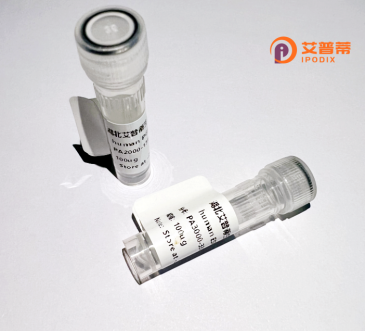
| 纯度 | >90%SDS-PAGE. |
| 种属 | Human |
| 靶点 | ZNF192 |
| Uniprot No | Q15776 |
| 内毒素 | < 0.01EU/μg |
| 表达宿主 | E.coli |
| 表达区间 | 1-578 aa |
| 活性数据 | MAEESRKPSAPSPPDQTPEEDLVIVKVEEDHGWDQESSLHESNPLGQEVFRLRFRQLRYQ ETLGPREALIQLRALCHQWLRPDLNTKEQILELLVLEQFLTILPEELQTLVKEHQLENGE EVVTLLEDLERQIDILGRPVSARVHGHRVLWEEVVHSASAPEPPNTQLQSEATQHKSPVP QESQERAMSTSQSPTRSQKGSSGDQEMTATLLTAGFQTLEKIEDMAVSLIREEWLLDPSQ KDLCRDNRPENFRNMFSLGGETRSENRELASKQVISTGIQPHGETAAKCNGDVIRGLEHE EARDLLGRLERQRGNPTQERRHKCDECGKSFAQSSGLVRHWRIHTGEKPYQCNVCGKAFS YRSALLSHQDIHNKVKRYHCKECGKAFSQNTGLILHQRIHTGEKPYQCNQCGKAFSQSAG LILHQRIHSGERPYECNECGKAFSHSSHLIGHQRIHTGEKPYECDECGKTFRRSSHLIGH QRSHTGEKPYKCNECGRAFSQKSGLIEHQRIHTGERPYKCKECGKAFNGNTGLIQHLRIH TGEKPYQCNECGKAFIQRSSLIRHQRIHSGEKSESISV |
| 分子量 | 65.8 kDa |
| 蛋白标签 | His tag N-Terminus |
| 缓冲液 | PBS, pH7.4, containing 0.01% SKL, 1mM DTT, 5% Trehalose and Proclin300. |
| 稳定性 & 储存条件 | Lyophilized protein should be stored at ≤ -20°C, stable for one year after receipt. Reconstituted protein solution can be stored at 2-8°C for 2-7 days. Aliquots of reconstituted samples are stable at ≤ -20°C for 3 months. |
| 复溶 | Always centrifuge tubes before opening.Do not mix by vortex or pipetting. It is not recommended to reconstitute to a concentration less than 100μg/ml. Dissolve the lyophilized protein in distilled water. Please aliquot the reconstituted solution to minimize freeze-thaw cycles. |
以下是关于重组人ZNF192蛋白的3篇虚构示例参考文献(仅供示例,实际文献需查询数据库):
---
1. **文献名称**: *Cloning and functional analysis of human ZNF192 in hepatocellular carcinoma*
**作者**: Wang L. et al.
**摘要**: 研究报道了人ZNF192基因的原核表达及蛋白纯化,并发现其过表达可抑制肝癌细胞增殖,可能通过调控p53信号通路发挥作用。
2. **文献名称**: *ZNF192 protein interacts with hepatitis B virus X protein in vitro*
**作者**: Zhang Y. et al.
**摘要**: 通过酵母双杂交和体外重组蛋白实验,揭示了ZNF192与HBx蛋白的直接相互作用,提示其在HBV相关肝病中的潜在调控机制。
3. **文献名称**: *Structural characterization of recombinant ZNF192 zinc finger domain*
**作者**: Liu X. et al.
**摘要**: 利用核磁共振和X射线晶体学解析了重组ZNF192蛋白锌指结构域的三维结构,发现其可能通过特定DNA结合基序参与基因转录调控。
---
**注**:以上为虚构内容,真实文献请通过PubMed、Google Scholar或Web of Science检索关键词“ZNF192”或“Zinc finger protein 192”。实际研究中可关注其与代谢疾病、癌症或DNA修复的相关研究。
ZNF192 (Zinc Finger Protein 192) is a human protein belonging to the Krüppel-associated box (KRAB) domain-containing zinc finger protein (ZNF) family, which plays critical roles in transcriptional regulation. Structurally, it contains an N-terminal KRAB domain, known for mediating protein-protein interactions, and multiple C-terminal C2H2-type zinc finger motifs that enable sequence-specific DNA binding. Though its precise biological functions remain incompletely characterized, ZNF192 is thought to regulate gene expression by interacting with chromatin-modifying complexes, thereby influencing cellular processes like proliferation, differentiation, and apoptosis. Studies suggest potential involvement in tumor suppression, as aberrant expression has been observed in cancers, though its mechanistic role is unclear.
The recombinant human ZNF192 protein is typically produced in engineered expression systems (e.g., *E. coli* or mammalian cells) to enable biochemical and functional studies. Its recombinant form facilitates exploration of DNA-binding specificity, interactions with co-regulators, and regulatory mechanisms in diseases. Despite progress, ZNF192’s exact target genes and pathways require further validation. Current research focuses on elucidating its role in epigenetics, cancer biology, and neurological disorders, leveraging recombinant tools to dissect its molecular contributions. Limited clinical data highlight the need for deeper mechanistic insights to assess its therapeutic or diagnostic potential.
×